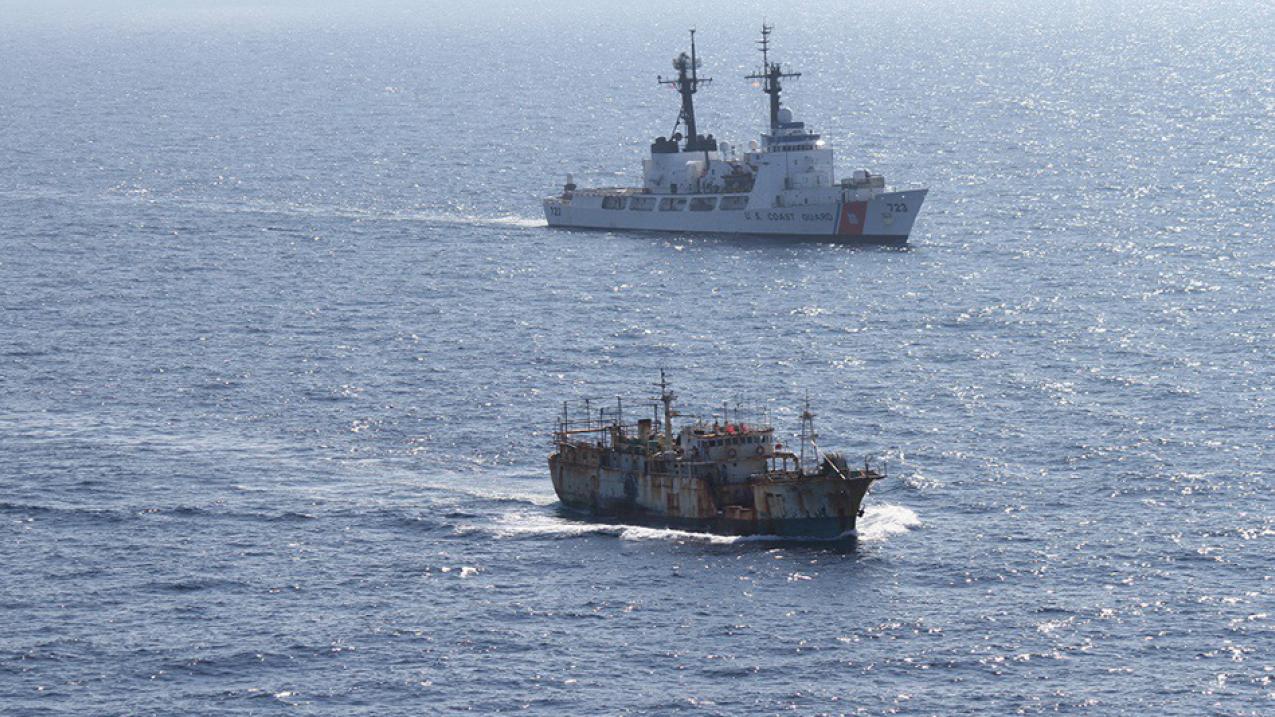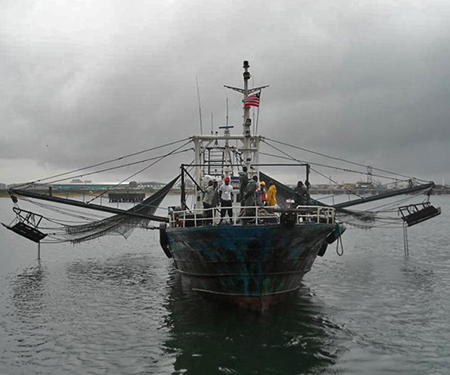
The crew of the Coast Guard Cutter Rush escorts the vessel Da Cheng, suspected of high seas drift net fishing, in the North Pacific Ocean on August 14, 2012. (Image credit: U.S. Coast Guard)
Cracking down on global fish crime
Why you should care about IUU fishing
What we’re doing to solve the problem
How you can help
Illegal fishing and seafood fraud are not just problems for fish. These practices damage our economy, hurt fishermen who play by the rules, threaten global food security, and rob future generations of precious ocean resources.
The term illegal, unreported, and unregulated fishing – known as IUU fishing – generally refers to fishing that violates national laws or international treaties intended to keep ocean animals and environments healthy. IUU fishing also includes unreported and misreported fishing activities, as well as fishing where there are no applicable conservation or management measures.
What IUU fishing looks like
There are many types of fishing crimes to investigate and enforcement actions that NOAA and legal authorities can take in response. For example:
-
NOAA Law Enforcement investigated a company that legal authorities later found guilty of working with a California couple who illegally smuggled harp seal oil into the United States. The company was fined $1.5 million.
-
A NOAA-led investigation resulted in a $25k penalty in 2016 for one company who purposely misbranded Russian-caught codfish as Icelandic cod fillets.
-
A NOAA investigation of Hawaii-based longline fishing vessel accused of fishing in the high seas with an expired permit led to a $6,297 settlement fine.
Who is most vulnerable to IUU fishing crimes?
While U.S. wild-capture fisheries are recognized as a global model of success, developing countries are most at risk for IUU fishing; they often lack the capacity or resources to guard against these crimes taking place off their coastlines.
The illicit nature of illegal fishing makes it difficult to quantify the full economic damage. But experts agree that the full global effect adds up to the billions or even tens of billions of dollars each year. The United States and its international partners are working to hold fishing vessels accountable to standards on par with those in U.S. waters. Such efforts will reduce illegal activities, improve working conditions and improve the chances that ocean animals are around for our children and grandchildren to enjoy.
As a recognized global leader in sustainable fisheries, the United States is working hard to share its sustainable fishing practices to other countries as well as address illegal fishing and seafood fraud. NOAA Fisheries is working with domestic and international partners and the fishing industry to increase monitoring, accountability, and enforcement — on the water, at the border and within the seafood supply chain.
We also work internationally to analyze illicit foreign fishing activities on the high seas and issue a Biennial Report to Congress that identifies nations that commit IUU fishing. We then coordinate with those nations on actions to correct identified problems. If sufficient action is not taken, the United States may issue a negative certification, stop certain fish product imports, and deny port privileges.

The United States passed the Port State Measures Agreement in 2014. This international treaty demands accountability for anyone coming in to a U.S. port to sell fish. The treaty looks at whether the operation is licensed and legal, where it has fished and whether it caught those fish legally.
In addition, the United States established a Seafood Import Monitoring Program for 13 species of seafood most vulnerable to illicit activities, which requires documentation from the point of harvest to the point of entry into U.S. commerce. This provides a way to trace seafood entering our domestic supply chain. In combination, these efforts will work to combat and deter illegal activities and improve sustainability of our global marine resources.
As seafood consumers, you can help us crack down on illegal fishing and seafood fraud. Here’s how:
One option is to buy domestic. Because U.S. fisheries – wild-capture and farmed – are among the most sustainable, buying U.S. seafood products are a safe bet.
Much of our seafood in the U.S. is imported, so you should check with your market’s fishmonger about where the seafood you want to buy comes from. Most U.S. retailers are also concerned about the responsible practices and sustainability of the seafood products they sell, and they have their own in-house sourcing policies to guard against illicit activities in their supply chains. Sellers should be able to tell you the country of origin.
See something? Say something.
If you have information about illegal or fraudulent seafood sales or activity, please report it to NOAA’s Office of Law Enforcement. Call 1-800-853-1964 or your local field office.
More
IUU Fishing & Seafood Fraud Web Portal
Illegal fishing and seafood fraud are not just problems for fish. These practices damage our economy, hurt fishermen who play by the rules, threaten global food security, and rob future generations of precious ocean resources.
The term illegal, unreported, and unregulated fishing – known as IUU fishing – generally refers to fishing that violates national laws or international treaties intended to keep ocean animals and environments healthy. IUU fishing also includes unreported and misreported fishing activities, as well as fishing where there are no applicable conservation or management measures.
What IUU fishing looks like
There are many types of fishing crimes to investigate and enforcement actions that NOAA and legal authorities can take in response. For example:
-
NOAA Law Enforcement investigated a company that legal authorities later found guilty of working with a California couple who illegally smuggled harp seal oil into the United States. The company was fined $1.5 million.
-
A NOAA-led investigation resulted in a $25k penalty in 2016 for one company who purposely misbranded Russian-caught codfish as Icelandic cod fillets.
-
A NOAA investigation of Hawaii-based longline fishing vessel accused of fishing in the high seas with an expired permit led to a $6,297 settlement fine.
Who is most vulnerable to IUU fishing crimes?
While U.S. wild-capture fisheries are recognized as a global model of success, developing countries are most at risk for IUU fishing; they often lack the capacity or resources to guard against these crimes taking place off their coastlines.
The illicit nature of illegal fishing makes it difficult to quantify the full economic damage. But experts agree that the full global effect adds up to the billions or even tens of billions of dollars each year. The United States and its international partners are working to hold fishing vessels accountable to standards on par with those in U.S. waters. Such efforts will reduce illegal activities, improve working conditions and improve the chances that ocean animals are around for our children and grandchildren to enjoy.
As a recognized global leader in sustainable fisheries, the United States is working hard to share its sustainable fishing practices to other countries as well as address illegal fishing and seafood fraud. NOAA Fisheries is working with domestic and international partners and the fishing industry to increase monitoring, accountability, and enforcement — on the water, at the border and within the seafood supply chain.
We also work internationally to analyze illicit foreign fishing activities on the high seas and issue a Biennial Report to Congress that identifies nations that commit IUU fishing. We then coordinate with those nations on actions to correct identified problems. If sufficient action is not taken, the United States may issue a negative certification, stop certain fish product imports, and deny port privileges.

The United States passed the Port State Measures Agreement in 2014. This international treaty demands accountability for anyone coming in to a U.S. port to sell fish. The treaty looks at whether the operation is licensed and legal, where it has fished and whether it caught those fish legally.
In addition, the United States established a Seafood Import Monitoring Program for 13 species of seafood most vulnerable to illicit activities, which requires documentation from the point of harvest to the point of entry into U.S. commerce. This provides a way to trace seafood entering our domestic supply chain. In combination, these efforts will work to combat and deter illegal activities and improve sustainability of our global marine resources.
As seafood consumers, you can help us crack down on illegal fishing and seafood fraud. Here’s how:
One option is to buy domestic. Because U.S. fisheries – wild-capture and farmed – are among the most sustainable, buying U.S. seafood products are a safe bet.
Much of our seafood in the U.S. is imported, so you should check with your market’s fishmonger about where the seafood you want to buy comes from. Most U.S. retailers are also concerned about the responsible practices and sustainability of the seafood products they sell, and they have their own in-house sourcing policies to guard against illicit activities in their supply chains. Sellers should be able to tell you the country of origin.
See something? Say something.
If you have information about illegal or fraudulent seafood sales or activity, please report it to NOAA’s Office of Law Enforcement. Call 1-800-853-1964 or your local field office.
More
IUU Fishing & Seafood Fraud Web Portal


